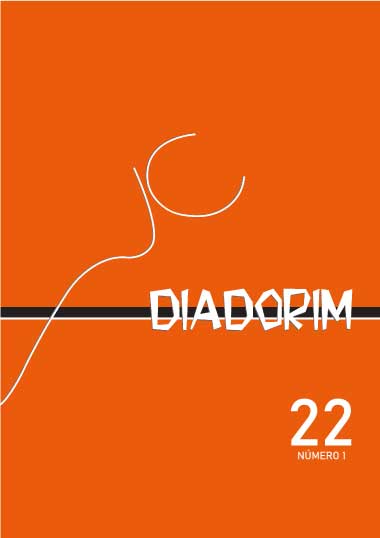Interlíngua
DOI:
https://doi.org/10.35520/diadorim.2020.v22n1a30523Palavras-chave:
aprendizagem de segunda língua, interlíngua, fossilizaçãoResumo
O artigo demonstra que os fatores pertinentes da aprendizagem da segunda língua podem ser encontrados graças a um exame comparado de três sistemas linguísticos produtivos, quais sejam: (1) a língua materna do aluno, (2) a competência do aluno na segunda língua, sua língua intermediária (Interlíngua), e (3) o sistema da língua-alvo. Finalmente, descrevem-se os processos que são responsáveis pela diferença entre a língua intermediária do aluno e sua competência desejada na língua-alvo.
Referências
BRIÈRE, Eugène J. A Psycholinguist Study of Phonological Interference. Haia: Mouton, 1968.
CHOMSKY, Noam. Aspects of the Theory of Syntax. Cambridge, Massachusetts: M.I.T. Press, 1965.
_____. “Linguistic Theory”. In: Northeast Conference on the Teaching of Foreign Languages, p. 43-49, 1966.
_____. “Linguistics and Philosophy”. In: HOOK, Sidney (org.). Language and Philosophy. Nova York: New York University Press, 1969. p. 51-94.
CORDER, Stephen Pit. “The Significance of Learner’s Errors”. In: IRAL, v. 5, 1967. p. 161-170.
COULTER, Kenneth. Linguistic Error: Analysis of the Spoken English of Two Native Russians. Dissertação de mestrado. University of Washington, 1968.
CROTHERS, Edward; SUPPES, Patrick. Experiments in Second-Language Learning. Nova York: Academic Press, 1967.
FODOR, Jerry A. Psychological Explanation: An Introduction to the Philosophy of Psychology. Nova York: Random House, 1968.
HAGGARD, Hark P. “Models and Data in Speech Perception”. In: WATHEN-DUNN, Weiant (org.). Models for the Perception of Speech and Visual Form. Cambridge, Massachusetts: M.I.T. Press, 1967. p. 331-339
HYMES, Dell. “On Communicative Competence”. In: PRIDE, J.B.; HOLMES, J. (orgs.). Sociolinguistics. Selected Readings. Harmondsworth: Penguin, 1972. p. 269-293
JAIN, Mahavir. “Error Analysis of an Indian English Corpus”. Artigo inédito. University of Edinburgh, 1969. [À época, no prelo.]
JAKOBOVITS, Leon A. “Second Language Learning and Transfer Theory: a Theoretical Assessment”. In: Language Learning, v. 19, junho de 1969. p. 55-86.
_____. Foreign Language Learning: A Psycholinguistic Analysis of the Issues. Berkshire: Newbury House, 1970.
KLINE, Helen. “Research in the Psychology of Second-Language Learning”. Artigo inédito. University of Minnesota, 1970.
LABOV, William. “Contraction, Deletion, and Inherent Variability of the English Copula”. In: Language, v. 45.4, 1969. p. 715-762.
LAKOFF, George. “On Generative Semantics”. In: STEINBERG, Danny; JAKOBOVITS, Leon (orgs.). Semantics: An Interdisciplinary Reader in Philosophy, Linguistics, Anthropology and Psychology. Cambridge: Cambridge University Press, 1970. [À época, no prelo.]
LAWLER, John; SELINKER, Larry. “On Paradoxes, Rules, and Research in Second-Language Learning”. In: Language Learning, v. 21, 1971. p. 27-43. [À época, no prelo.]
LENNEBERG, Eric H. Biological Foundations of Language. Nova Jersey: John Wiley and Sons Inc., 1967.
NEMSER, William: “Approximative Systems of Foreign Language Learners”. In: IRAL, v. 9, 1971. p. 115-123.
REIBEL, D.A. “Language Learning Strategies for the Adult”. Comunicação lida no Second International Congress of Applied Linguistics. Cambridge University, setembro de 1969.
RICHARDS, Jack C. “A Non-Contrastive Approach to Error Analysis”. Artigo entregue na TESOL Convention. São Francisco, março de 1970.
SELINKER, Larry. “Language Transfer”. In: General Linguistics, v. 9, 1969, p. 67-92.
WATKIN, K.L. “Fossilization and its Implications Regarding the Interlanguage Hypothesis”. Artigo inédito. University of Washington, 1970.
WEINREICH, Uriel. Languages in Contact. Nova York: The Linguistic Circle of New York, 1953.
Downloads
Publicado
Edição
Seção
Licença
Transferência de direitos autorais - Autorização para publicação
Caso o artigo submetido seja aprovado para publicação, já fica acordado que o autor autoriza a UFRJ a reproduzi-lo e publicá-lo na Diadorim: Revista de Estudos Linguísticos e Literários, entendendo-se os termos "reprodução" e "publicação" conforme definição respectivamente dos incisos VI e I do artigo 5° da Lei 9610/98. O artigo poderá ser acessado pela internet, a título gratuito, para consulta e reprodução de exemplar do artigo para uso próprio de quem a consulta. Essa autorização de publicação não tem limitação de tempo, ficando a UFRJ responsável pela manutenção da identificação do autor do artigo.

A Revista Diadorim utiliza uma Licença Creative Commons Atribuição-NãoComercial 4.0 Internacional (CC BY-NC 4.0).

